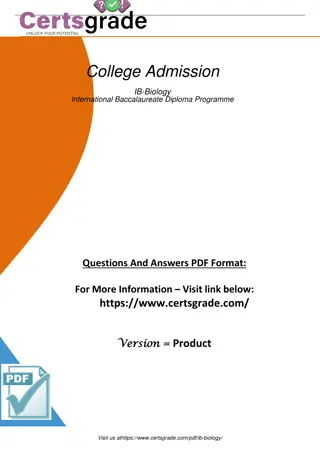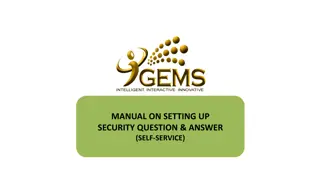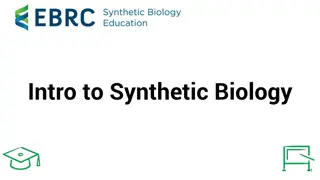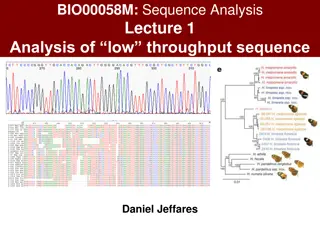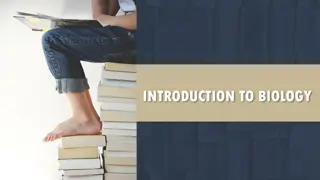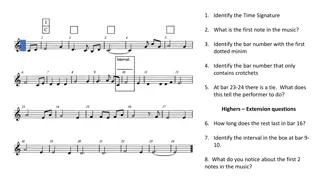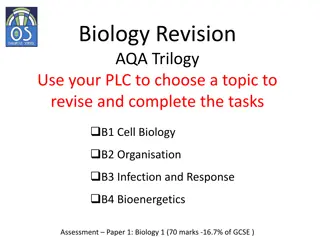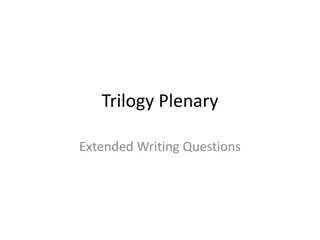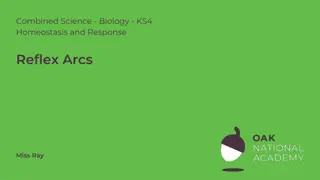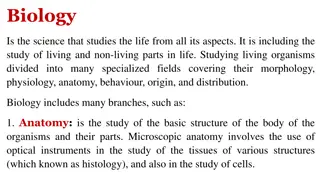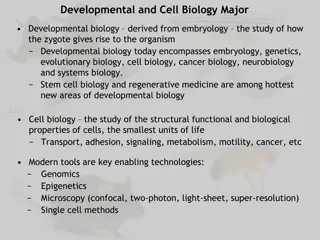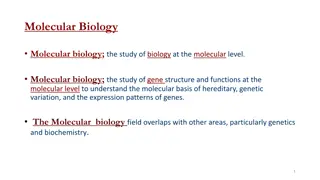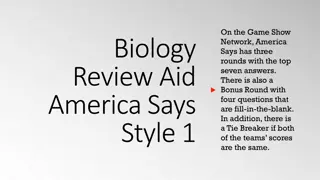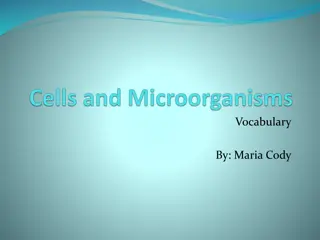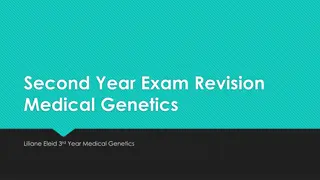Biology Bell Ringer Questions and Answers
Explore a collection of biology bell ringer questions and answers covering topics such as plant cell parts, vegetative and reproductive plant parts, essential plant parts, flower anatomy, and plant propagation methods. Stay accountable for your bell ringers and ensure active participation by writing down the questions and answers daily.
Download Presentation

Please find below an Image/Link to download the presentation.
The content on the website is provided AS IS for your information and personal use only. It may not be sold, licensed, or shared on other websites without obtaining consent from the author. Download presentation by click this link. If you encounter any issues during the download, it is possible that the publisher has removed the file from their server.
E N D
Presentation Transcript
KOSSA Sample Questions Bell Ringers
Bell- ringer Expectations You will keep a full weeks worth of bell- ringers before turning them in If you are absent, you are responsible for getting the questions from your classmates This DOES NOT mean waiting until Friday, and then copying the whole week from a classmate You must write the question and answer for full credit Write the date each day followed by the question and answer
Example Your name 1-1-11 1.What is ? a.Answer: 2.What is ? a.Answer: 1-2-11 1.What is ? a.Answer: 2.What is ? a.Answer:
Date 1. The 3 major plant cell parts are: a. Cell wall, chloroplast, goigi b. Cell wall, goigi, nucleus c. Cell wall, cytoplasm, nucleus d. Cell wall, nucleus, vacuole 2. What are the major vegetative parts of the plant? a. Leaf, flower, seed b. Leaf, root, stem c. Root, seed, bud d. Stem, flower, node
Answers 1. The 3 major plant cell parts are: a. Cell wall, chloroplast, goigi b. Cell wall, goigi, nucleus c. Cell wall, cytoplasm, nucleus d. Cell wall, nucleus, vacuole 2. What are the major vegetative parts of the plant? a. Leaf, flower, seed b. Leaf, root, stem c. Root, seed, bud d. Stem, flower, node
Date 1. What are the major reproductive parts of the plant? a. Leaf root, stem b. Leaf, flower, seed c. Leaf, fruit, stem d. Flower, fruit, seed 2. What are the four essential plant parts? a. leaf, flower, stem, root b. Leaf, root, seed, flower c. Flower, seed, petal, root d. Stem, flower, root, seed
Answers 1. What are the major reproductive parts of the plant? a. Leaf root, stem b. Leaf, flower, seed c. Leaf, fruit, stem d. Flower, fruit, seed 2. What are the four essential plant parts? a. leaf, flower, stem, root b. Leaf, root, seed, flower c. Flower, seed, petal, root d. Stem, flower, root, seed
Date 1. The four main parts of the flower: a. stamen, style, ovary, pistil b. Petal, pistil, stamen, sepal c. Anther, petal, sepal, receptacle d. Anther, petal, stamen, receptacle 2. Plant production from a cutting is a type of ___________________ propagation. a. Asexual b. Bisexual c. Sexual d. Unsexual
Answers 1. The four main parts of the flower: a. stamen, style, ovary, pistil b. Petal, pistil, stamen, sepal c. Anther, petal, sepal, receptacle d. Anther, petal, stamen, receptacle 2. Plant production from a cutting is a type of ___________________ propagation. a. Asexual b. Bisexual c. Sexual d. Unsexual
Date 1. A monocotyledon is defined as: a. Embryo with no cotyledon b. Embryo with single cotyledon c. Embryo with two cotyledons d. Embryo with three cotyledons 2. Cotyledons are defined as: a. Vascular bundle b. Seedlings c. Embryo d. Seed leaves
Answers 1. A monocotyledon is defined as: a. Embryo with no cotyledon b. Embryo with single cotyledon c. Embryo with two cotyledons d. Embryo with three cotyledons 2. Cotyledons are defined as: a. Vascular bundle b. Seedlings c. Embryo d. Seed leaves
Date 1. The required conditions for germination include: a. Moisture, soil, temperature b. Soil, air temperature c. Moisture, air, optimal temperatures d. Light, soil, temperature 2. The most favorable temperature for seed germination is: a. 65- 80 b. 32- 105 c. 32- 65 d. 80- 105
Answers 1. The required conditions for germination include: a. Moisture, soil, temperature b. Soil, air temperature c. Moisture, air, optimal temperatures d. Light, soil, temperature 2. The most favorable temperature for seed germination is: a. 65- 80 b. 32- 105 c. 32- 65 d. 80- 105
Date 1. Vigor is: a. The ability of seeds to germinate under different conditions b. The ability of the seed to work hard c. The ability of the seed to grow d. The ability of the seed to grow fast 2. A monocot plant example is: a. Bean b. Carrot c. Oats d. Turnip
Answers 1. Vigor is: a. The ability of seeds to germinate under different conditions b. The ability of the seed to work hard c. The ability of the seed to grow d. The ability of the seed to grow fast 2. A monocot plant example is: a. Bean b. Carrot c. Oats d. Turnip
Date 1. Dicots have: a. Fibrous roots b. Tap roots c. Non- fibrous roots d. Adventurous roots 2. Which of the following is not a specialized stem: a. Tuber b. Buld c. Tendril d. Root
Answers 1. Dicots have: a. Fibrous roots b. Tap roots c. Non- fibrous roots d. Adventurous roots 2. Which of the following is not a specialized stem: a. Tuber b. Buld c. Tendril d. Root
Date 1. An evergreen is an example of an: a. Annual b. Biannual c. Perennial d. Winter annual 2. Trees and shrubs that drop all of their leaves in the fall: a. annual b. biannual c. deciduous d. evergreen
Answers An evergreen is an example of an: a. Annual b. Biannual c. Perennial d. Winter annual 2. Trees and shrubs that drop all of their leaves in the fall: a. annual b. biannual c. deciduous d. evergreen
Date 1. Parent material of the glacial origin that was deposited by wind: a. alluvium b. loess c. glacial till d. topography 2. Many soils have been formed from material originally moved by: a. glaciers b. wind c. water d. human
Answers 1. Parent material of the glacial origin that was deposited by wind: a. alluvium b. loess c. glacial till d. topography 2. Many soils have been formed from material originally moved by: a. glaciers b. wind c. water d. human
Date 1. As materials such as organic matter and minerals are altered in the soil, this process is called: a. Translocation b. Transpiration c. Transformation d. Relocation 2. Most productive soils range from: a. 1- 4 pH b. 4- 9 pH c. 7- 9 pH d. 9- 14 pH
Answers 1. As materials such as organic matter and minerals are altered in the soil, this process is called: a. Translocation b. Transpiration c. Transformation d. Relocation 2. Most productive soils range from: a. 1- 4 pH b. 4- 9 pH c. 7- 9 pH d. 9- 14 pH
Date 1. Which of the following is known as the most highly visible erosion? a. Gully erosion b. Rill erosion c. Sheet erosion d. Steep erosion 2. Which practice will reduce and prevent soil erosion on property? a. Mechanical tillage b. Crop rotation c. Monocropping d. Traditional tillage
Answers 1. Which of the following is known as the most highly visible erosion? a. Gully erosion b. Rill erosion c. Sheet erosion d. Steep erosion 2. Which practice will reduce and prevent soil erosion on property? a. Mechanical tillage b. Crop rotation c. Monocropping d. Traditional tillage
Date 1. Three functions of a growing medium: a. Provide fertilizer, moisture, oxygen b. Provide seed cover, support, light c. Provide nutrients, support, oxygen d. Provide seed cover, nutrients, moisture 2. Common components is a soilless mix are: a. Peat moss, perlite, vermiculite b. Sand, silt, clay c. Sand, peat moss, bark d. Perlite, vermiculite, miracle grow
Answers 1. Three functions of a growing medium: a. Provide fertilizer, moisture, oxygen b. Provide seed cover, support, light c. Provide nutrients, support, oxygen d. Provide seed cover, nutrients, moisture 2. Common components is a soilless mix are: a. Peat moss, perlite, vermiculite b. Sand, silt, clay c. Sand, peat moss, bark d. Perlite, vermiculite, miracle grow
Date 1. A soil that contains equal amounts of sand, silt, and clay is called a: a. Even mix b. Sandy silt c. Uniform mix d. Loam 2. Soil is classified by the amount of: a. sand, silt, clay and loam it contains b. Where it is found in the soil profile c. Silt, clay, gravel d. Sand, silt, clay it contains
Answers 1. A soil that contains equal amounts of sand, silt, and clay is called a: a. Even mix b. Sandy silt c. Uniform mix d. Loam 2. Soil is classified by the amount of: a. sand, silt, clay and loam it contains b. Where it is found in the soil profile c. Silt, clay, gravel d. Sand, silt, clay it contains
Date 1. A document that guides the operation of a business: a. Business plan b. Marketing plan c. Mission statement d. Planning statement 2. Fertilizer containing 15- 10- 26 contains: a. 15% nitrogen, 10% phosphate, 26% potash b. 15% phosphate, 10% nitrogen, 26% potash c. 15% potash, 10% phosphate, and 26% nitrogen d. None of the above
Answers 1. A document that guides the operation of a business: a. Business plan b. Marketing plan c. Mission statement d. Planning statement 2. Fertilizer containing 15- 10- 26 contains: a. 15% nitrogen, 10% phosphate, 26% potash b. 15% phosphate, 10% nitrogen, 26% potash c. 15% potash, 10% phosphate, and 26% nitrogen d. None of the above
Date 1. Ben gave Cami an approximate price for yard work to be completed this is called a (an) a. Cost summation b. Estimate c. Bid d. Contingency cost For the new landscaping job you will be required to utilize landscape fabric. The area to be covered is 16 X 16 and the fabric measures 3 X 5 . How many rolls of fabric will it take to cover the area? a. 18 b. 16 c. 5 d. 19 2.
Answers 1. Ben gave Cami an approximate price for yard work to be completed this is called a (an) a. Cost summation b. Estimate c. Bid d. Contingency cost For the new landscaping job you will be required to utilize landscape fabric. The area to be covered is 16 X 16 and the fabric measures 3 X 5 . How many rolls of fabric will it take to cover the area? a. 18 b. 16 c. 5 d. 19 2.
Date 1. Use the Punnett Square method to estimate the possible gene combinations for the following situation. Crossing a yellow marigold (YY) with an orange marigold (yy). What would be the offspring s gene combination? a. YY b. Yy c. Yy d. yY
Answer 1. Use the Punnett Square method to estimate the possible gene combinations for the following situation. Crossing a yellow marigold (YY) with an orange marigold (yy). What would be the offspring s gene combination? a. YY b. Yy c. Yy d. yY
Date 1. Use the Punnett Square method to estimate the possible gene combinations for the following situation. Crossing a red rose (RR) with a white rose (rr). What would the phenotype ration be? a. 4:0 dominant: recessive b. 2:1 dominant: recessive c. 2:2 dominant: recessive d. 0:4 dominant recessive
Answer 1. Use the Punnett Square method to estimate the possible gene combinations for the following situation. Crossing a red rose (RR) with a white rose (rr). What would the phenotype ration be? a. 4:0 dominant: recessive b. 2:1 dominant: recessive c. 2:2 dominant: recessive d. 0:4 dominant recessive
Date 1. The method of asexual propagation that involves the growing of small pieces of plant tissue: a. Propagation culture b. Plant culture c. Cell culture d. Tissue culture 2. Qualitative traits are traits controlled by: a. Several pairs of genes b. A single pair of genes c. Six pairs of genes d. Seven pairs of genes
Answers 1. The method of asexual propagation that involves the growing of small pieces of plant tissue: a. Propagation culture b. Plant culture c. Cell culture d. Tissue culture 2. Qualitative traits are traits controlled by: a. Several pairs of genes b. A single pair of genes c. Six pairs of genes d. Seven pairs of genes
Date 1. You have decided to buy your mother a corsage for Mother s Day. The original cost for a three flower corsage is $15.00 however; the flower shop is running a special $13.00 price for Mother s Day. What would be the percentage reduction from the original cost? a. 21.3% b. 15.4% c. 10% d. 40% You have a 30 X 45 greenhouse. You need to install tables using the maximum potential of the space. Each table measures 6 X 12 . Using the given information, determine how many tables you must install. Consider the following stipulations: - There must be a minimum of 5 aisle lengthwise in the middle of the greenhouse - There must be minimum of 1; between the long sides of benches and/ or walls - You must fit as many benches as possible in the greenhouse a. 4 b. 11 c. 20 d. 10 2.
Answers 1. You have decided to buy your mother a corsage for Mother s Day. The original cost for a three flower corsage is $15.00 however; the flower shop is running a special $13.00 price for Mother s Day. What would be the percentage reduction from the original cost? a. 21.3% b. 15.4% c. 10% d. 40% You have a 30 X 45 greenhouse. You need to install tables using the maximum potential of the space. Each table measures 6 X 12 . Using the given information, determine how many tables you must install. Consider the following stipulations: - There must be a minimum of 5 aisle lengthwise in the middle of the greenhouse - There must be minimum of 1; between the long sides of benches and/ or walls - You must fit as many benches as possible in the greenhouse a. 4 b. 11 c. 20 d. 10 2.
Date 1. You have 10 tables that are 6 X 12 . Each plant flat is 12 X 24 . Determine how many flats will fit on each table. a. 36 b. 48 c. 17 d. 18 As an greenhouse owner there are many different items that must be stored in the headhouse in order to have the items on hand at the right time. Given your headhouse is 15 X 32 use the following setup s to determine the minimum amount of potting soil you are able to store. Remember the following: -pallets of potting soil 3 X 3 -there must be minimum of 2 between the long sides of the pallets and/ or walls -there must be a minimum of 4 aisle lengthwise in the middle of the headhouse a. 24 b. 18 c. 12 d. 6 2.
Answer 1. You have 10 tables that are 6 X 12 . Each plant flat is 12 X 24 . Determine how many flats will fit on each table. a. 36 b. 48 c. 17 d. 18 As an greenhouse owner there are many different items that must be stored in the headhouse in order to have the items on hand at the right time. Given your headhouse is 15 X 32 use the following setup s to determine the minimum amount of potting soil you are able to store. Remember the following: -pallets of potting soil 3 X 3 -there must be minimum of 2 between the long sides of the pallets and/ or walls -there must be a minimum of 4 aisle lengthwise in the middle of the headhouse a. 24 b. 18 c. 12 d. 6 2.
Date 1. You have been hired to fill 3 planter boxes that hold about 10 cubic feet of soil each. You have the supply store deliver 6 cubic yards of potting mix. How many cubic yards of potting soil do you need to fill the planter boxes? a. 11.5 b. 6 c. 30 d. 1.1 2. Which of the following the correct soil layer order? a. Sub soil, topsoil, parent material, bed rock b. Parent material, sub soil, top soil, bed rock c. Parent material, top soil, sub soil, bed rock d. Top soil, sub soil, parent material, bed rock
Answers 1. You have been hired to fill 3 planter boxes that hold about 10 cubic feet of soil each. You have the supply store deliver 6 cubic yards of potting mix. How many cubic yards of potting soil do you need to fill the planter boxes? a. 11.5 b. 6 c. 30 d. 1.1 2. Which of the following the correct soil layer order? a. Sub soil, topsoil, parent material, bed rock b. Parent material, sub soil, top soil, bed rock c. Parent material, top soil, sub soil, bed rock d. Top soil, sub soil, parent material, bed rock




